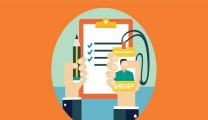I. What is work efficiency?
Work efficiency is the level of completion of the assigned and assigned work of an employee and depends on many different factors from the circumstances and time to the individual factors affecting the person performing the work. Each company has its own job completion criteria applied to employees. From there, companies can come up with the best training and skill development plans.
II. Skills needed to improve work efficiency
What skills do you need to improve work efficiency to achieve the desired goals? Let's find out in the content below:
1. Communication
Communication is an essential skill for every employee. It is a soft skill to create career success. People with good communication skills tend to be more proactive in learning skills and work experience. In general, good communication skills will help you be more confident and comfortable when expressing your opinions, personal views as well as your working skills in any working environment. Take advantage and promote communication skills with colleagues and partners to work better.
2. Division of work items
To improve work efficiency, it is necessary to divide the work head into certain categories. Listing out each specific task will help to not only shorten the implementation schedule, but also improve performance.
3. Time Management
By organizing your time properly, you will limit distractions and focus more on the main task of the job. For example, you should focus on spending 4-5 hours to complete the work, say no to social networks, do private work. The more time you organize yourself, the more time you can save to rest and relax for yourself.
4. Teamwork
Almost any organization requires their employees to have teamwork skills. At that time, the high or low work efficiency will depend on the cohesion and coordination between members. Open your heart and accept everyone's opinions and suggestions. Remember "One tree makes not young / Three trees together make a high mountain."

III. 6 ways to improve work efficiency
Work efficiency directly affects your "pocket", "rice and clothes". Once you have mastered the necessary skills to improve efficiency, then how to apply and promote those skills best. Take a look at the methods of performance evaluation in the following content:
1. Maintain focus
A small tip so that you can focus more on your work is that you should set yourself a specific timetable such as: Summarizing report data in 1 hour, sitting to learn about products in 1 hour, etc. If you are a person, If you are distracted or distracted by social networks or messages, make sure your phone is far away from you. Another important thing, you should adjust, have a reasonable rest time, eat in moderation to maintain health and alertness during work.
2. Careful, meticulous
Training yourself to be careful and meticulous will help you perform more effectively. Meticulousness and care always bring the best results. Therefore, train yourself this virtue because employers often tend to appreciate candidates who are perfectionist and serious in the working process.
3. Keep your mind at ease
A relaxed mind is the foundation for a productive working day. If you are stressed, arrange a time to rest for yourself, stop working for a bit and spend time relaxing, exercising or simply eating lightly to increase energy for the body. Absolutely limit working late, late because that both increases stress and does not achieve high efficiency.
4. Actively learn
Actively learning is a good habit, helping you bring many opportunities at work. Actively learning from others will support you in every way. From actively learning, you will gradually form an active thinking, when there is a problem, you can flexibly handle it. Being proactive is also a good problem-solving skill because it helps you improve and expand your relationships.
5. Regularly evaluate work performance
Self-assessed self-efficacy is a useful performance evaluation criterion for you to look back on how far you've done, and whether you've made progress compared to the past. You can use metrics such as deadlines, rating scales, and even ask others to evaluate to give you the most objective assessment of yourself. The process of self-assessment and self-reflection helps you to recognize the differences between the set expectations and the actual results, from which you will be able to have experiences to limit the bad points and promote the good.
6. Self-motivation
Self-motivation will help you avoid bad habits. The motivation generated from the profession is a factor that helps you overcome difficulties. Whenever you feel depressed, lose motivation to work, remember what is motivating you. Motivation comes from everywhere: music, books or simply the people around you.
Above are all the knowledge and skills to help you improve work efficiency. One of the ways that many companies use today is to apply software to work.












Replies to This Discussion